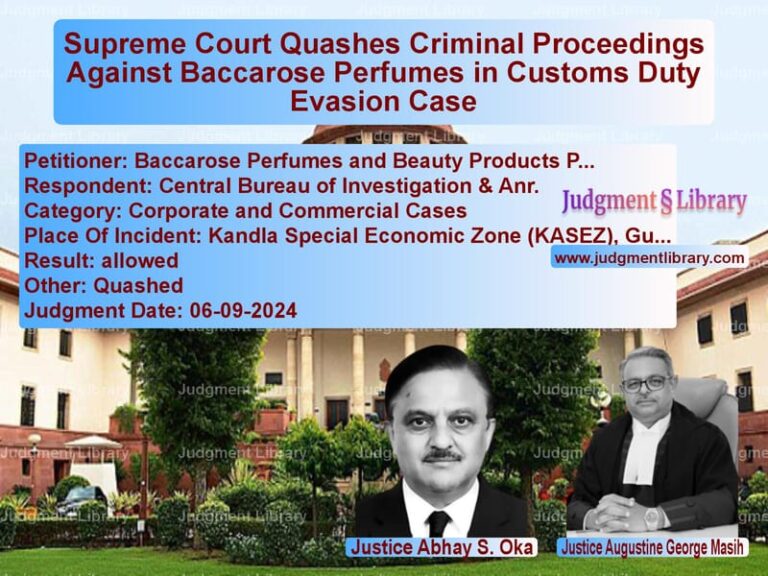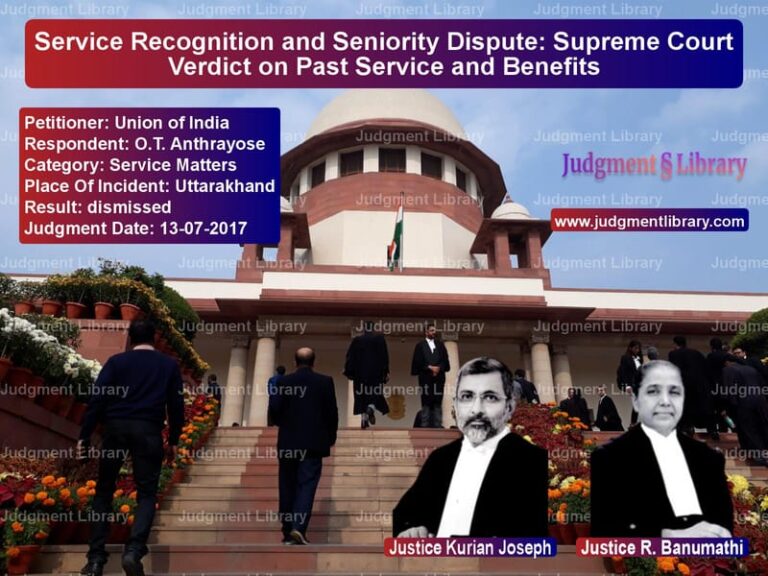NDPS Act Case: Supreme Court Acquits One Accused, Upholds Conviction of Another
The case of Balwinder Singh vs. Narcotics Control Bureau and Satnam Singh vs. Narcotics Control Bureau is a crucial ruling under the Narcotic Drugs and Psychotropic Substances Act, 1985 (NDPS Act). The Supreme Court had to determine whether the convictions under Section 21(c) of the NDPS Act were valid and whether the procedural safeguards were adequately followed.
Background of the Case
The case originates from an incident on December 12, 2005, when the Narcotics Control Bureau (NCB) received secret information about the smuggling of heroin from Amritsar to Chandigarh. Acting on this information, the NCB set up a naka (checkpoint) at Sector 25, Chandigarh, and intercepted a white Indica car carrying suspected contraband.
As per the prosecution’s version:
- Upon noticing the checkpoint, two individuals fled from the vehicle, while one person, identified as Satnam Singh, remained inside.
- A search of the car led to the recovery of four packets of heroin concealed in the door panels and the rear seat cover.
- Satnam Singh was arrested on the spot, and his statement was recorded under Section 67 of the NDPS Act.
- Based on his statement, Balwinder Singh was later arrested and charged as a co-accused.
Legal Issues Raised
The Supreme Court had to address the following key legal questions:
- Whether the conviction of Balwinder Singh and Satnam Singh was justified under Section 21(c) of the NDPS Act.
- Whether the confessional statements recorded under Section 67 of the NDPS Act were admissible as evidence.
- Whether procedural lapses, if any, affected the fairness of the trial.
- Whether the sentence imposed was appropriate considering the circumstances.
Petitioner’s Arguments (Balwinder Singh and Satnam Singh)
The defense raised the following arguments:
- The conviction of Balwinder Singh was based solely on the statement of Satnam Singh, which was recorded under Section 67 of the NDPS Act. Since this provision had been declared inadmissible in the case of Tofan Singh v. State of Tamil Nadu, his conviction should be set aside.
- The case of Satnam Singh was flawed due to procedural violations, particularly concerning the alleged planting of contraband and the reliability of independent witnesses.
- Both accused argued that they had been falsely implicated, and the evidence presented by the prosecution was insufficient to prove their guilt beyond a reasonable doubt.
Respondent’s Arguments (Narcotics Control Bureau)
The NCB, on the other hand, argued:
- The recovery of 4 kg of heroin from Satnam Singh’s vehicle was conclusive proof of possession.
- The confessional statement of Satnam Singh, even if ignored, was corroborated by witness testimonies and forensic evidence.
- While Balwinder Singh was not apprehended at the scene, his involvement was established through Satnam Singh’s statement and other circumstantial evidence.
Supreme Court’s Ruling
The Supreme Court delivered a split decision on the two accused:
1. Acquittal of Balwinder Singh
- The Court ruled that Balwinder Singh’s conviction was solely based on the confessional statement of Satnam Singh, which is inadmissible following the ruling in Tofan Singh v. State of Tamil Nadu.
- There was no independent evidence linking him to the contraband or the vehicle from which the drugs were seized.
- Therefore, the Supreme Court set aside his conviction and ordered his release.
2. Conviction of Satnam Singh Upheld
- The Court found that Satnam Singh was directly in possession of the vehicle containing 4 kg of heroin.
- His conviction was supported by forensic evidence, witness testimonies, and his own inconsistent statements.
- The High Court’s decision to sentence him to 12 years of rigorous imprisonment and a fine of ₹1,50,000 was upheld.
Impact of the Judgment
The ruling has several implications:
- Reinforcement of Tofan Singh ruling: The Supreme Court reaffirmed that statements made under Section 67 of the NDPS Act cannot be used as evidence in criminal trials.
- Burden of proof on prosecution: Conviction must be based on independent evidence beyond reasonable doubt.
- Differentiation between primary and secondary accused: The Court made a clear distinction between direct possession of contraband (Satnam Singh) and indirect association (Balwinder Singh).
Conclusion
The Supreme Court’s decision in Balwinder Singh vs. NCB & Satnam Singh vs. NCB upholds the fundamental principles of criminal law, emphasizing that convictions cannot be based on inadmissible confessional statements. While Balwinder Singh was acquitted, the conviction of Satnam Singh was upheld based on substantial evidence. This case reinforces the importance of procedural safeguards and sets a precedent for future NDPS cases.
Petitioner Name: Balwinder Singh & Satnam Singh.Respondent Name: Narcotics Control Bureau.Judgment By: Justice B.R. Gavai, Justice Hima Kohli, Justice Prashant Kumar Mishra.Place Of Incident: Chandigarh.Judgment Date: 22-09-2023.
Don’t miss out on the full details! Download the complete judgment in PDF format below and gain valuable insights instantly!
Download Judgment: balwinder-singh-&-sa-vs-narcotics-control-bu-supreme-court-of-india-judgment-dated-22-09-2023.pdf
Directly Download Judgment: Directly download this Judgment
See all petitions in Drug Possession Cases
See all petitions in Bail and Anticipatory Bail
See all petitions in Custodial Deaths and Police Misconduct
See all petitions in Judgment by B R Gavai
See all petitions in Judgment by Hima Kohli
See all petitions in Judgment by Prashant Kumar Mishra
See all petitions in partially allowed
See all petitions in Modified
See all petitions in supreme court of India judgments September 2023
See all petitions in 2023 judgments
See all posts in Criminal Cases Category
See all allowed petitions in Criminal Cases Category
See all Dismissed petitions in Criminal Cases Category
See all partially allowed petitions in Criminal Cases Category







